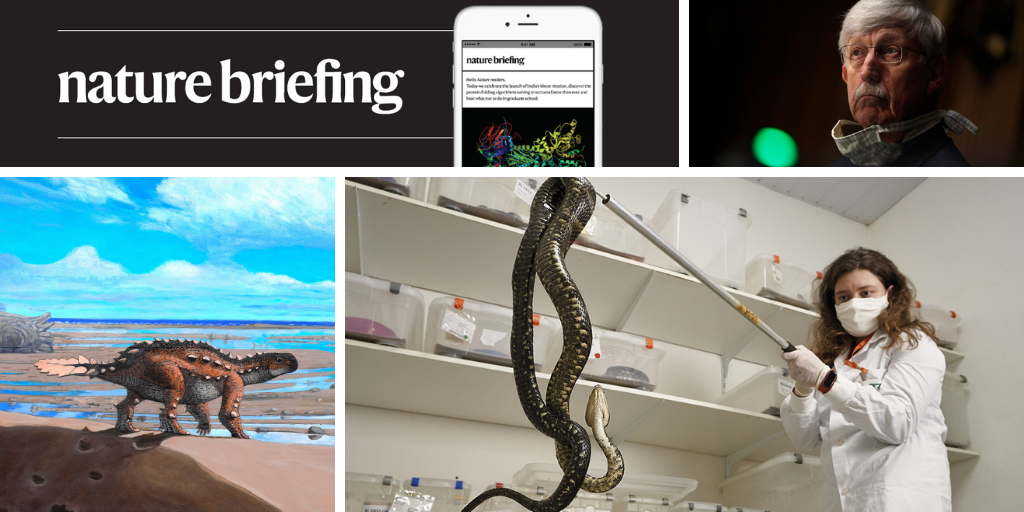NATURE BRIEFING 06 December 2021 Sign up for Nature Briefing
Hello Nature readers, would you like to get this Briefing in your inbox free every day? Sign up here. An artist’s reconstruction of Stegouros elengassen.Luis Pérez López
Spike-tailed ankylosaur was built like a tankChilean researchers have discovered a new species of ankylosaur in the subantarctic tip of Chile. Stegouros elengassen was about 2 metres long, with a relatively large head, slender limbs and a flat, frond-shaped tail unlike any seen before. A blow from the tail would have been like being ‘whacked in the shins by a battle ax’, says palaeontologist James Kirkland.The New York Times | 5 min readReference: Nature paperFrancis Collins on science and the NIHThis month, Francis Collins will step down as director of the US National Institutes of Health (NIH) after more than 12 years at the helm of the world’s biggest public funder of biomedical research. Collins will stay on at the NIH to continue research in his laboratory. He spoke to Nature about some highlights of his time leading the agency and issues it will face in the future, including the politicization of science. ‘We’re in a really bad place. If science happens to produce a result that a political perspective doesn’t like, then science has to be attacked,’ says Collins.Nature | 8 min readThree snow leopards die from COVIDThree snow leopards (Panthera uncia) living at a zoo in Nebraska have died from COVID-19. The animals are classed as vulnerable to extinction, with just a few thousand estimated to be living in the wild. The coronavirus has been detected in several species of big cat in zoos, as well as domestic cats, dogs, gorillas, mink and other species — although the risk to humans from infected animals is thought to be low.The Washington Post | 3 min readRead more: Animals could be key to our COVID future (Nature | 12 min read, from March)Features & opinionWhy reproducibility reforms failLack of rigour is often blamed on pressure to publish. But when reproducibility researcher Nicole Nelson asked preclinical scientists why they were not following relevant recommendations, they said their decisions were driven by the practicalities of animal research. ‘Yes, perverse incentives exist, but their role as a barrier to reform should be assessed, not assumed,’ argues Nelson. She recommends that ethnography be harnessed to interrogate oversimplified stories about decisions.Nature | 4 min read How one telescope will change everythingThe James Webb Space Telescope (JWST) is one of the most ambitious scientific projects ever attempted and the product of three decades of painstaking work. Its centrepiece: an unimaginably flawless mirror the size of a house, which must travel 1.5 million kilometres from Earth and unfold itself into perfect smoothness. While we cross all our fingers and toes for a successful 22 December launch, take a dive deep into the JWST’s scientific goals, its technical virtuosity and the great telescopes that paved its way.Quanta | 46 min readCoronapod: Pandemic mental healthResearchers have used data from helplines in 20 countries to assess the impacts that COVID-19 and associated political and public-health measures have had on mental health. Contrary to expectations, loneliness and concerns about the impacts of the pandemic drove most of the callers, rather than imminent threats such as suicidal thoughts or abuse.Nature Coronapod Podcast | 12 min listenSubscribe to the Nature Podcast on Apple Podcasts, Google Podcasts or Spotify.Where I work Eletra de Souza is a PhD student at the University of São Paulo, Brazil.Credit: Pablo Albarenga for Nature
Ecologist Eletra de Souza fell in love with ‘a beautiful, giant, albino ball python’ (Python regius) when she was 12 years old. Now, she studies their interactions with humans, aiming to inform policies to mitigate snake bites. In this photo, she is holding a juvenile red-tailed boa (Boa constrictor) — a dangerous line of work, she notes. ‘But we learn to respect them and understand their defence behaviours, and two people always work together when handling them.’ (Nature | 3 min read) On Friday, our fictional flightless friend Leif Penguinson hid in the serene green of Sankeien Garden in Japan. Did you find the penguin? When you’re ready, here’s the answer.This newsletter is always evolving — tell us what you think! Please send your feedback to briefing@nature.com.Flora Graham, senior editor, Nature BriefingWith contributions by Smriti Mallapaty
https://www.nature.com/articles/d41586-021-03657-2
